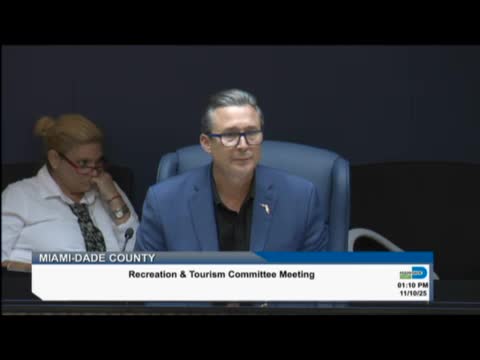Committee approves ordinance updating Children’s Trust board and adds aspirational residency guideline
Get AI-powered insights, summaries, and transcripts
Subscribe
Summary
The Miami‑Dade County Recreation and Tourism Committee voted unanimously on Nov. 10 to approve an ordinance amending Chapter 2 of the county code to revise membership and term limits for the Children’s Trust board to conform with state statute 125.901.
The Miami‑Dade County Recreation and Tourism Committee voted unanimously on Nov. 10 to approve an ordinance amending Chapter 2 of the county code to revise membership and term limits for the Children’s Trust board to conform with state statute 125.901.
The ordinance, presented as item 2(a), updates board composition and allows a mayoral designee to serve on the Children’s Trust. Commissioner McGee moved the ordinance and Vice Chairwoman Steinberg seconded. Steinberg also proposed an amendment asking that appointing entities give preference — as an aspirational guideline rather than a legal requirement — to Miami‑Dade County residents when filling position‑appointed seats; the committee adopted that amendment without objection before the roll‑call vote.
The change stems from the committee’s effort to align local code with the state law cited in the ordinance. Amanda Gorski, representing the Children’s Trust, told the committee the trust has a 33‑member board: seven gubernatorial appointees, five at‑large community seats and additional members appointed by virtue of the positions they hold (for example, representatives from institutional partners). Gorski said at‑large members are appointed via a nominating committee and that she could supply the names and organizations of current at‑large appointees on request.
A committee member who identified as an early coordinator of the Children’s Trust urged the committee to preserve community input even if the formal board membership changes, suggesting the county or administration work with the Children’s Trust to create an advising mechanism or committee to maintain community voice.
The clerk conducted a roll‑call vote on the ordinance (and two supplements). Commissioner McGee was recorded as the mover and Vice Chairwoman Steinberg as the seconder; the motion passed unanimously.
What the measure does and what it does not: the ordinance formalizes board membership language in county code to match the state statute referenced in the ordinance and clarifies term limits and membership categories. The adopted aspirational residency language requests — but does not require — that appointing entities consider county residents for position‑based seats.
Next steps: The ordinance includes standard severability language and an effective date; the committee’s action advances the ordinance consistent with the committee process and the matter will proceed according to the county’s legislative schedule.
